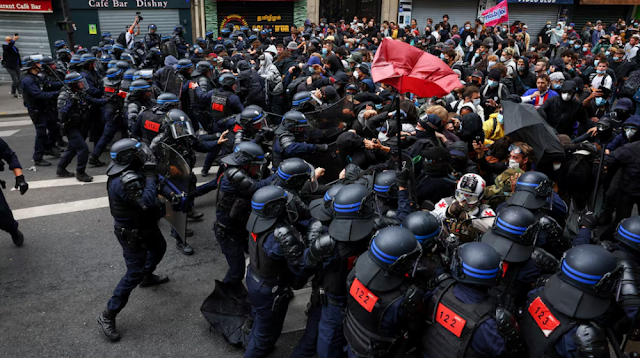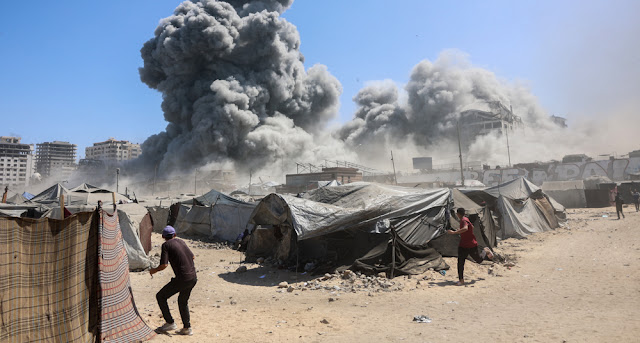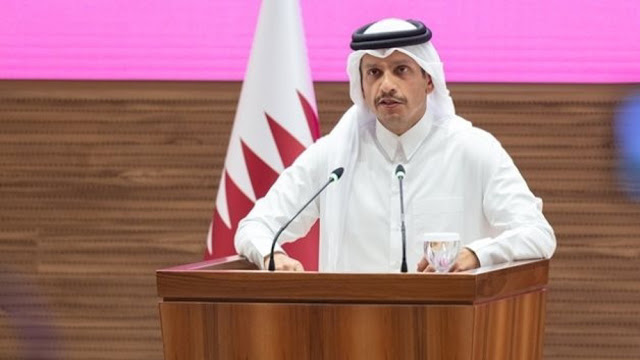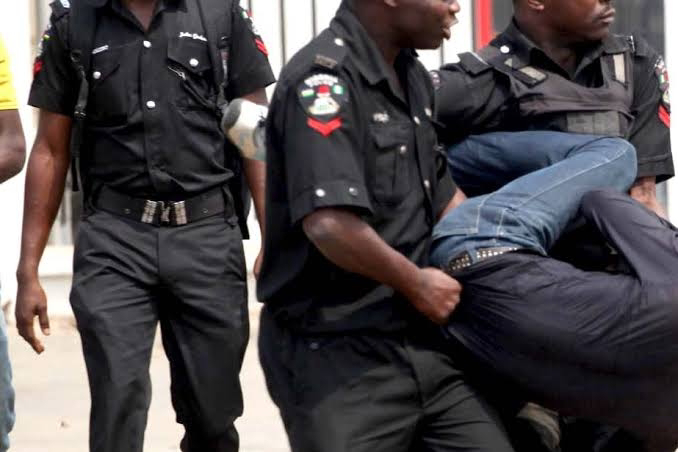Police officers in riot gear clash with demonstrators gathering during a day of protests as part of a grassroots protest movement called ” Block Everything” calling for nationwide all-day disruption, in Paris, France, September 10, 2025. (Photo by Reuters)
In a wave of civil unrest reminiscent of the tumultuous 2018 “Yellow Vest” protests, French police have arrested dozens of individuals across the country as a new protest movement, dubbed “Block Everything,” brought widespread disruption to cities, highways, and public services. The movement, which has rapidly gained momentum through social media campaigns over the summer of 2025, is emerging as a significant challenge to France’s political establishment, with protesters expressing deep frustration with the nation’s governance and economic policies.
The “Block Everything” movement, while initially sparked by right-wing groups disillusioned with the state of French politics, has evolved into a broader coalition that now includes significant participation from left-wing and far-left factions. Analysts describe the movement as a decentralized, leaderless uprising that unites disparate groups under a shared belief that France’s political system is fundamentally broken and no longer capable of addressing the needs of its citizens. The protests, which began with sporadic blockades and demonstrations, have escalated into coordinated efforts to disrupt transportation, commerce, and public services, plunging France into a state of heightened tension.
Origins and Evolution of the “Block Everything” Movement
The “Block Everything” movement first emerged in early June 2025, when small groups of activists, primarily from right-wing circles, began organizing online under hashtags such as #BloquerTout and #FranceEnColere (France in Anger). These early protests were driven by grievances over rising inflation, stagnant wages, and what many perceived as an out-of-touch political elite. Social media platforms, particularly X, served as a catalyst for the movement, allowing organizers to coordinate actions and amplify their message to a broader audience.
By mid-summer, the movement had undergone a significant transformation. What began as a right-wing initiative was gradually co-opted by left-wing and far-left groups, who saw an opportunity to channel widespread discontent into a broader critique of capitalism, globalization, and France’s centralized governance. This ideological shift has made “Block Everything” a uniquely amorphous movement, lacking a single unifying agenda but united by a shared sense of urgency and frustration. Protesters have called for everything from wealth redistribution and climate action to the resignation of President Emmanuel Macron and the dissolution of the current government.
Comparisons to the 2018 “Yellow Vest” protests are inevitable. The “Yellow Vests,” initially triggered by a proposed fuel tax hike, quickly evolved into a nationwide revolt against Macron’s economic policies, which many viewed as favoring the wealthy and corporations over ordinary workers. Similarly, “Block Everything” has tapped into a deep well of public discontent, with protesters accusing the government of prioritizing corporate interests and globalist agendas over the needs of the French people. However, unlike the “Yellow Vests,” which were largely driven by working-class and rural communities, “Block Everything” has attracted a more diverse coalition, including urban youth, students, and intellectuals alongside traditional working-class supporters.
Political Turmoil Sets the Stage
The protests come at a time of acute political instability in France. On Monday, September 8, 2025, the French parliament ousted Prime Minister Francois Bayrou in a dramatic no-confidence vote, marking the latest chapter in a series of political upheavals. Bayrou, who had served as prime minister for less than a year, faced criticism for his handling of economic challenges and his inability to bridge divides between France’s fractious political factions. His ousting was seen as a victory for opposition parties, particularly the far-left France Unbowed (La France Insoumise) and the far-right National Rally (Rassemblement National), both of which have capitalized on public dissatisfaction to advance their agendas.
In response to Bayrou’s removal, President Macron swiftly appointed Sebastien Lecornu as his fifth prime minister in under two years, a move that has done little to quell public anger. Lecornu, a close ally of Macron and a former defense minister, is viewed by many as a continuation of the status quo. His appointment has been met with skepticism by protesters, who see him as emblematic of the entrenched political class they seek to dismantle. The far-left France Unbowed party wasted no time in announcing plans to introduce a no-confidence motion against Lecornu, signaling that his tenure may be as turbulent as that of his predecessors.
Interestingly, the far-right National Rally, led by Marine Le Pen, has adopted a more pragmatic stance, indicating a willingness to work with Lecornu for the time being. This strategic decision reflects the National Rally’s broader ambition to position itself as a viable governing force in the lead-up to the 2027 presidential election. However, analysts warn that this temporary truce is unlikely to last, as the National Rally’s base is increasingly aligned with the anti-establishment sentiments fueling the “Block Everything” protests.
Protests Escalate with Blockades and Disruptions
The “Block Everything” movement has lived up to its name, with protesters employing a range of tactics designed to paralyze France’s infrastructure and draw attention to their demands. On the morning of Wednesday, September 10, 2025, Interior Minister Bruno Retailleau reported that approximately 50 hooded individuals attempted to establish a blockade in Bordeaux, a major city in southwestern France. The group, described as highly organized, targeted key transportation routes, including highways and railway lines, in an effort to disrupt the flow of goods and people.
In a separate incident near Toulouse, a cable fire—suspected to be an act of sabotage by protesters—caused significant disruptions to traffic between Toulouse and Auch. Although the fire was quickly contained by emergency services, it underscored the movement’s ability to target critical infrastructure with minimal resources. Authorities have not yet confirmed whether the fire was directly linked to “Block Everything,” but the timing and location suggest a connection to the broader wave of protests.
Across the country, similar scenes of disruption have unfolded. In Paris, protesters blocked major intersections and set up makeshift barricades in the city center, leading to clashes with riot police. In Lyon, demonstrators targeted logistics hubs, disrupting the delivery of goods to supermarkets and businesses. In Marseille, port workers joined the protests, halting operations at one of France’s busiest ports and causing delays in international shipping. These actions have not only strained France’s economy but also highlighted the movement’s ability to mobilize diverse groups, from students and workers to farmers and small business owners.
Government Response and Public Reaction
The French government has responded to the protests with a combination of force and dialogue. Interior Minister Retailleau, who has taken a hardline stance against the demonstrators, announced that police would be deployed in full force to prevent further disruptions. “We will not allow a small minority to hold the country hostage,” Retailleau said in a televised address on Wednesday. He also called for calm and urged protesters to engage in dialogue with the government rather than resorting to vandalism and blockades.
However, the government’s heavy-handed response has only fueled public anger. Images of riot police using tear gas and batons to disperse peaceful protesters have circulated widely on social media, further galvanizing support for the movement. Many French citizens, even those who do not actively participate in the protests, express sympathy for the demonstrators’ grievances. A recent poll conducted by the French Institute of Public Opinion (IFOP) found that 62% of respondents believe the government is out of touch with the needs of ordinary people, while 48% support the “Block Everything” movement’s call for systemic change.
The protests have also sparked a heated debate about the state of democracy in France. Critics of the movement argue that its tactics—particularly the blockades and acts of sabotage—are undemocratic and harmful to the public. “While frustration with the government is understandable, disrupting the lives of ordinary citizens is not the answer,” said Claire Dubois, a political commentator for Le Monde. Others, however, see the protests as a necessary response to a political system that has failed to address pressing issues such as income inequality, climate change, and the erosion of public services.
Economic and Social Implications
The “Block Everything” protests have already had a significant impact on France’s economy. The disruptions to transportation and logistics have caused delays in the delivery of goods, leading to shortages of essential items in some regions. Small businesses, already struggling with the effects of inflation and rising energy costs, have been hit particularly hard by the blockades. The French Retail Federation estimated that the protests could cost businesses billions of euros in lost revenue if they continue into the holiday season.
The tourism industry, a cornerstone of France’s economy, is also feeling the strain. With major cities like Paris and Bordeaux experiencing significant disruptions, international visitors are reconsidering travel plans, particularly ahead of the lucrative autumn and winter seasons. The French Tourism Board has issued a statement urging calm and reassuring visitors that the country remains safe, but the images of burning barricades and police clashes are likely to deter some tourists.
Socially, the protests have deepened existing divisions within French society. The movement’s broad ideological spectrum—encompassing both far-right and far-left elements—has led to tensions within the protests themselves. In some instances, clashes have broken out between different factions of protesters, with right-wing groups accusing their left-wing counterparts of hijacking the movement for their own ends. These internal divisions could undermine the movement’s cohesion in the long term, but for now, the shared goal of disrupting the status quo appears to be holding the coalition together.
International Context and Comparisons
The “Block Everything” protests are not occurring in a vacuum. Across Europe, similar movements have emerged in response to economic hardship, political dysfunction, and growing distrust in institutions. In Germany, protests against energy prices and government policies have gained traction, while in Italy, far-right and populist movements have capitalized on public discontent to challenge the ruling coalition. The rise of these movements reflects a broader trend of anti-establishment sentiment sweeping the continent, fueled by the lingering effects of the COVID-19 pandemic, the war in Ukraine, and global economic uncertainty.
The parallels with the “Yellow Vest” protests are particularly striking. Like “Block Everything,” the “Yellow Vests” began as a grassroots movement driven by economic grievances but quickly evolved into a broader critique of governance. However, the “Yellow Vests” ultimately failed to achieve lasting political change, in part due to their lack of a clear leadership structure or coherent policy platform. Whether “Block Everything” will suffer the same fate remains to be seen, but its ability to sustain momentum over the summer suggests a level of organization and resilience that could make it a more enduring force.
The Path Forward
As France grapples with the fallout from the “Block Everything” protests, the government faces a delicate balancing act. On one hand, it must restore order and prevent further economic disruption; on the other, it must address the underlying grievances that have fueled the movement. President Macron, whose approval ratings have plummeted in recent months, has called for national dialogue to address the crisis, but his overtures have been met with skepticism by protesters who view him as part of the problem.
For the “Block Everything” movement, the challenge lies in translating its disruptive tactics into tangible political outcomes. While the protests have succeeded in drawing attention to widespread discontent, they risk alienating the broader public if disruptions continue to impact daily life. Some within the movement have called for the creation of a formal platform or set of demands, but others argue that its decentralized nature is its greatest strength, allowing it to remain flexible and resistant to co-optation by political elites.
The coming weeks will be critical in determining the trajectory of the protests. If the government fails to address the protesters’ concerns, the movement could escalate further, potentially leading to more widespread unrest. Conversely, if the movement overreaches or alienates its base, it could lose momentum and fade into obscurity, much like the “Yellow Vests” before it.
Conclusion
The “Block Everything” protests represent a pivotal moment in France’s modern history, a reflection of deep-seated frustrations with a political system that many believe has failed to deliver on its promises. As the movement continues to disrupt cities and challenge the government, it raises fundamental questions about the future of democracy, governance, and social cohesion in France. Whether it will lead to meaningful change or simply deepen the country’s divisions remains an open question, but one thing is clear: the “Block Everything” movement has shaken France to its core, and its impact will be felt for years to come.







